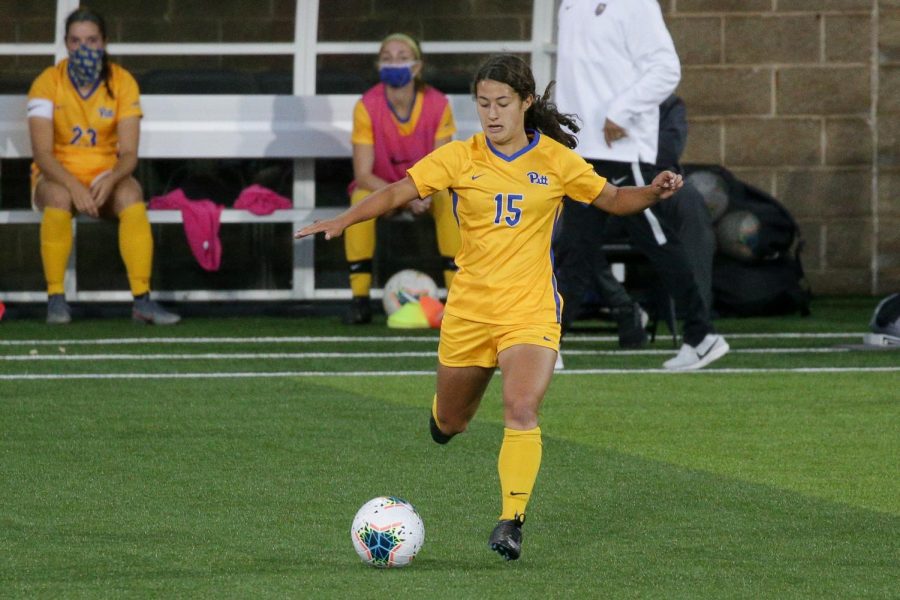Pitt women’s soccer’s rise boosted by Canadian talent
Thomas Yang | Senior Staff Photographer
First-year midfielder Chloe Minas.
November 4, 2020
Soccer has existed in Canada since 1876, but several Canadian players have more recently made a significantly noticeable impact in the soccer world. From LAFC’s Mark-Anthony Kaye, Bayern Munich’s Alphonso Davies and the Portland Thorns’ Christine Sinclair, the Great White North has slowly become a hotbed for footballers with high potential.
Pitt women’s soccer head coach Randy Waldrum has taken particular interest in Canadian talent, signing many recruits from the United States’ northern neighbor.
The current Panther’s squad features six Canadian players — first-year forward Chantelle Parker from Milton, Ontario; first-year midfielder Chloe Minas from Montreal; sophomore forward Leah Pais from Mississauga, Ontario; sophomore forward Amanda West from Burlington, Ontario; sophomore midfielder Anna Bout from Cambridge, Ontario; and sophomore midfielder Bex Bartosh from the Hiawatha First Nation in Ontario.

Pitt women’s soccer hasn’t fielded a team with this many Canadian players since 2014. Bout, a regular starter for the Panthers, said she chose Pitt by looking for a program on the upswing.
“I always knew I wanted to come to the States to play soccer,” Bout said. “When I was going through the recruiting process, the coaches really sold it for me. Randy is a very big name, and he was going to turn the program around.”
Pais, a transfer from the University of Albany, found that Pitt offered a unique experience outside of the soccer program.
“I liked seeing and meeting new people,” Pais said. “I like exploring new states and being in a different country.”

Pais said the United States and Canada feature different training styles in youth soccer. While Americans focus more on strength, speed and stamina, Canadians shift their attention to the mental aspects of the game. She said the two different styles can coexist and that the Canadian players have occasionally shared their wisdom with the rest of the team.
“We play a bit more technical up in Canada,” Pais said. “We sometimes teach the other [Americans] on the team … that if you have the IQ, you can get around people. It’s starting to rub off on them, which is really good.”
The meshing of the physical American play style with the mental Canadian approach has created a more unified Pitt team, Bout and Pais concluded. The six Canadian players have found that they maintain a stronger bond off the field, however.
“To a certain extent, we get the process,” Bout said. “Soccer-wise it isn’t that different, but I’ve played with Leah and Amanda before, and we’ve developed a connection coming from the same place.”
Pais has four goals and 10 points in 14 matches this season, both second only to West, who has put together an accomplished career in her first two years alone. The Burlington native has written her name throughout the Pitt history books this season. She tallied 13 goals and 30 points this fall, both single-season records, and she owns the all-time record of career points with 59.

Pais also sees the rise in Canada’s national women’s team as similar to the rise of Pitt’s women’s soccer program.
“We’re doing a lot better than we were doing last year. We’re challenging more teams, we’re winning more games and there are more positives than negatives,” Pais said. “As the years go on and more girls come in, it’ll create such a competitive environment and we’ll be at practice just wanting to get better.”
In their loss against No. 2 Florida State on Oct. 15, head coach Randy Waldrum expressed the direction he wants his program to follow.
“FSU is a program we’re aspiring to be like, and we’re growing to [that level],” Waldrum said.
The Seminoles also look far and away for talent on the field. They have seven players from outside the United States on their roster, including players from Canada, China and Sweden.
Bout and Pais both recognize the abundance of ability to come out of Canada lately and how specifically the national women’s program has proven integral in the development of young female soccer players around the country. Pais sees significant improvement in Canadian women’s soccer, praising its role in helping potential athletes reach their goals. She thinks Pitt represents a distinct opportunity for many of these young players.
“We’re on the come-up,” Pais said. “We’re not the greatest, but we’re slowly getting girls from all over the country, and we’re telling them, ‘You can come play for us, and we will give you the opportunity to go pro.’”



